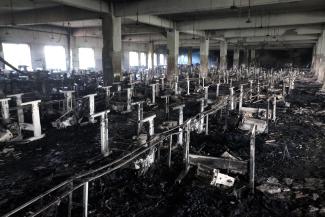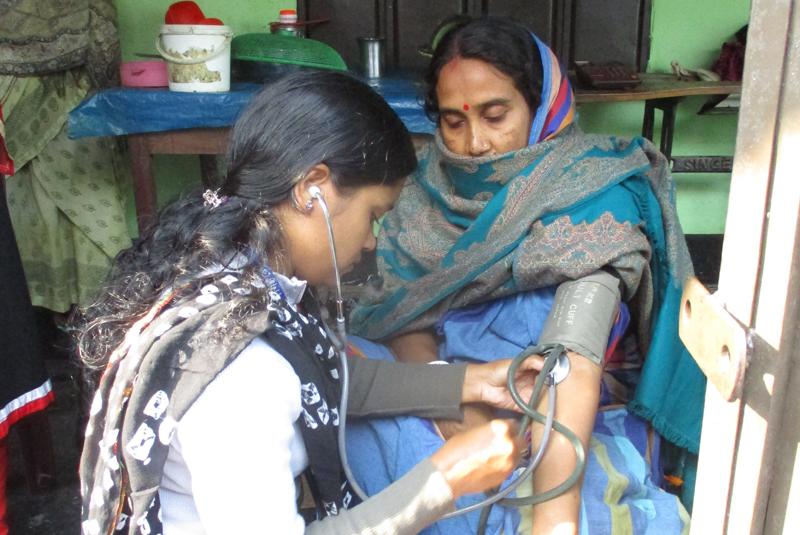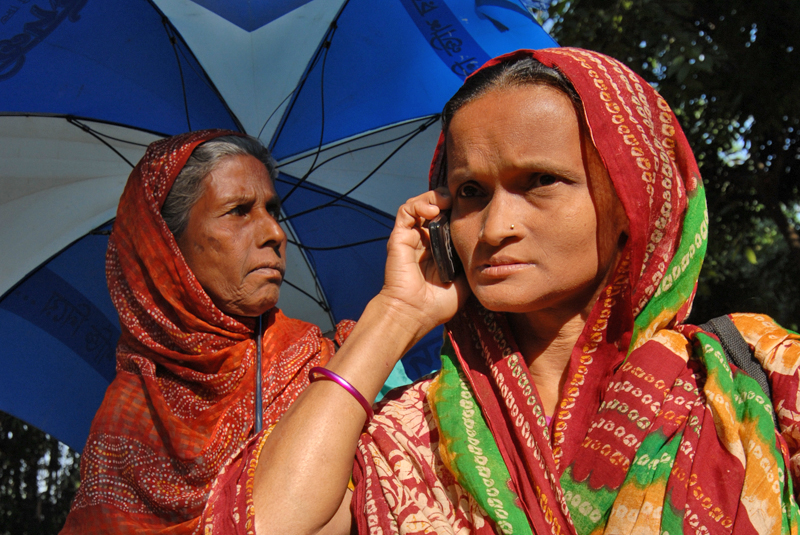Working conditions
Limited union rights

Except for the downturn in exploitative child labour, there is no empirical evidence to support Ms Scholte’s basic thesis that working conditions are improving. Fires at several textile factories – most recently at the Tazreen Fashions factory, where people died in a blaze on 24 November 2012 – speak for themselves. According to the advocacy group International Labour Rights Forum (ILRF), fires in the Bangladeshi garment industry have claimed the lives of around 700 employees since 2005.
Furthermore, many CCC studies (e.g. Alam et al. 2012, CCC 2012, Burckhardt 2011, CCC 2009, Burckhardt 2008) have shown that inhumane working conditions are still prevalent in Bangladesh. Very low wages, working times of 10 to 14 hours, six or even seven days a week, compulsory overtime, very restricted opportunities for unionisation and discrimination against women are not unusual. Sadly, nothing has changed in that respect since the 1980s.
The minimum wage in Bangladesh is currently 3,000 taka (about € 28) a month, which, as Ms Scholte correctly observes, is not enough to meet basic needs even in Bangladesh. The last time the minimum wage was raised in 2010, after a tough industrial action by workers. However, the extra purchasing power it provided has long been eroded away by rising food prices. Hence trade union demands further increase – but it must be noted that less than one percent of women textile workers are unionised. Instead of addressing that issue, Ms Scholte quotes a scholar from an institute close to the unions who points out that household helpers servants are even worse off. In our view, playing the suffering of one group against another is an unacceptable relativisation of human rights.
Even if isolated improvements have been made at some model factories and thousands of people’s working and living conditions are now better as a result, the benefits are certainly not felt by the millions of workers in the industry as a whole. All that has improved, at most, is European’s awareness for labour rights at the international level (Barrientos/Smith 2006).
Ms Scholte insinuates that the CCC is calling for a boycott of clothing products from Bangladesh. That is incorrect. As the CCC has pointed out repeatedly, boycotts will not solve the problems. Indeed, the CCC categorically states its position in the publication “Im Visier: Discounter” (CCC 2012), which Ms Scholte cites but seems not to have read carefully. We, too, believe that boycotts would hit seamstresses particularly hard because any drop of international garment orders would mean losses of jobs. The CCC does not call for a boycott; it calls for better working conditions.
Local organisations
The CCC shares the assessment of Uddin Ahmed of the Bangladesh Institute of Labour Studies in the way he was quoted by Ms Scholte: local trade unions and civil society groups deserve support. That is why the CCC has been cooperating with them for years.
In spring 2012, for example, the CCC was involved in negotiations on a fire safety agreement with which labour organisations and individual companies finally intend to address fire risk. But the agreement will only come into effect once it is endorsed by four major multinational players. That is a condition set by PVH, the company that owns Tommy Hilfiger and Calvin Klein. Apart from PVH, however, only Tchibo has put pen to paper. Hence the CCC appeals to every company operating in the relevant sector to sign up to the fire safety agreement. It would also be good if employers’ associations in Bangladesh promoted this approach.
In Ms Scholte’s article, Uddin Ahmed calls upon Germans to support the trade unions in Bangladesh. Our view is that the Federal Ministry for Economic Cooperation and Development (BMZ) should also do so. Instead, it focuses on cooperation with the industry associations BGMEA (Bangladesh Garment Manufacturers and Exporters Association) and BKMEA (Bangladesh Knitwear Manufacturers and Exporters Association) through its development agency GIZ.
A great deal of money is spent on promoting exports, developing new markets and raising productivity. That serves the interests of employers, many of whom are members of parliament and make sure that the minimum wage is not raised. The meagre funding that GIZ dispenses to local NGOs in Bangladesh is derisory in comparison (see also Burckhardt 2011).
Ms Scholte quotes Fazil Hoque, a former BKMEA president, who portrays the industry associations as being open to social and environmental standards, but claims that factory owners are obstructive. Our own experience is different. A training initiative launched by Tchibo in Bangladesh was taken up by individual companies, but it was not supported by the industry associations.
UN guidelines
In June 2011, the UN Human Rights Council endorsed a set of principles designed to help companies to acknowledge and rise to their responsibility to respect human rights. Swiftly and categorically praised by the EU Commission, the blueprint for business requires companies to exercise the due diligence needed to gauge the impacts of their actions and avoid causing damage to human beings and the environment.
On the other hand, governments need to ensure that human rights are respected. The government of Bangladesh does not sufficiently fulfil the state’s duty to protect its people. It enforces neither labour laws nor the fire protection regulations that are needed. It does not employ enough factory inspectors, and those that are on duty do not have the means to police standards across the industry in an effective manner.
Given the failure of the state to act in Bangladesh, we believe that the European Union and Germany are duty-bound to introduce framework legislation to regulate European/German companies’ actions abroad. It is not acceptable that such companies should systematically and handsomely profit from unacceptable labour conditions in developing countries. In cooperation with the civil society network CorA (Corporate Responsibility), the CCC thus demands reforms:
- Enterprises based in the EU should be made liable for the environmental and human impacts of their business operations.
- Persons harmed by European enterprises should be given access to legal protection.
- Enterprises should be required to produce annual reports on their businesses’ human and environmental impacts.
The European Commission has proposed a transparency directive. Unfortunately, Germany’s Federal Government opposes this initiative. According to the Commission, only 2,500 of a total of 42,000 large companies in the EU currently prepare sustainability reports. Nonetheless, the German government insists that such reports should remain voluntary and does not wish to oblige companies to become transparent. Rather than acting as a shield for private enterprise, it would do well to promote systematically human rights in the global fashion industry.
Gisela Burckhardt is chief executive of FEMNET, a group that supports the international Clean Clothes Campaign (CCC) which includes 20 independent organisations in Germany and more than 300 member organisations all over Europe. Burckhardt has been to Bangladesh for research purposes several times. The CCC cooperates closely with partners in garment-producing countries.
gisela.burckhardt@femnet-ev.de
http://www.cleanclothes.org
http://www.femnet-ev.de
Dominic Kloos works for the CCC member Ecumenical Network Rhine-Moselle-Saar and has been active for the non-governmental organisation MATI in Bangladesh and Germany for six years.
info@oekumenisches-netz.de











